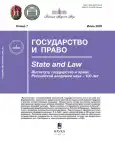Interdisciplinary scientific dimension of the evolution of legal culture
- Authors: Zaloilo M.V.1
-
Affiliations:
- Institute of Legislation and Comparative Law under the Government of the Russian Federation
- Issue: No 7 (2025)
- Pages: 42-51
- Section: Discussions and debates
- URL: https://journal-vniispk.ru/1026-9452/article/view/306381
- DOI: https://doi.org/10.31857/S1026945225070052
- ID: 306381
Cite item
Abstract
The paper analyzes topical issues of the application of an interdisciplinary approach in the study of legal culture as a special case of its use in scientific knowledge in general. Approaches to understanding and the preferred order of application of an interdisciplinary approach in the study of legal culture are developed, the stages of determining the methodology of scientific research of legal culture and the formation of an optimal range of doctrinal and empirical sources used are formulated; the potential of using a number of practically oriented specific techniques of legal work in the study of manifestations of legal culture in legal reality is shown. It is summarized that the application of an interdisciplinary approach in the study of legal culture in the modern historical period, characterized by the expansion and deepening of the interrelationships of various fields of knowledge and types of practical activities, the “erasing” of clear boundaries between them, is not only desirable, but also a necessary technique to achieve a scientifically sound and practically effective result of the undertaken research, which ensures the proper level of its scientific novelty and relevance for application in legal practice and further increment of scientific and practical knowledge.
About the authors
M. V. Zaloilo
Institute of Legislation and Comparative Law under the Government of the Russian Federation
Author for correspondence.
Email: z-lo@mail.ru
34 B. Cheremushkinskaya str., 117218 Moscow, Russia
References
- Vedeneev Yu. A. Jurisprudence of traditions and innovations of the postmodern era in search of oneself // Lex russica. 2024. Vol. 77. No. 1. Pp. 144–155 (in Russ.).
- Gorban V. S. Formation of a modern historiographical model of political and legal knowledge // State and Law. 2024. No. 7. Pp. 64–78 (in Russ.).
- Dawkins R. Egoistic gene. M., 2013 (in Russ.).
- Zaloilo M. V. The concept of meme (memetics) and the primary mechanisms of socio-cultural evolution of law // Law. HSE Journal. 2024. Vol. 17. No. 3. Pp. 39–49 (in Russ.).
- Zaloilo M. V. Legal memetics in the study of law enforcement // Journal of Russ. law. 2024. Vol. 28. No. 11. Pp. 19–32 (in Russ.).
- Historical and legal yearbook – 2023 / under the general ed. of D. A. Pashentsev, M. V. Zaloilo. M., 2024 (in Russ.).
- Kerimov D. A. Culture and technology of lawmaking. M., 1991. P. 17 (in Russ.).
- Kovkel N. F. Semiotics of law: problems of defining basic concepts and choosing a paradigm // Law studies. 2017. No. 4. Pp. 38–59 (in Russ.).
- Lazarev V. V. The state in the light of memology // Journal of Russ. law. 2020. No. 3. Pp. 5–18 (in Russ.).
- Lysak I. V. Interdisciplinarity: advantages and problems of application // Modern problems of science and education. 2016. No. 5 (in Russ.).
- Pashentsev D. A., Zaloilo M. V., Dorskaya A. A. Change of technological patterns and legal development of Russia. M., 2024 (in Russ.).
- Potapov V. V., Potapova R. K. Internet memetics as an emotionogenic medium of network communication // Herald of the RAS. A series of literature and language. 2022. Vol. 81. No. 2. Pp. 78–91 (in Russ.).
- Savenkov A. N. Philosophy of Law and the formation of the Russian state-civilization. M., 2024 (in Russ.).
- Stepin V. S. Philosophy of Science. General problems. M., 2006. P. 321 (in Russ.).
- Stepin V. S. Civilization and culture. SPb., 2011. Pp. 43, 110 (in Russ.).
- Tagard P. Interdisciplinarity: trade zones in cognitive science // Logos. 2014. No. 1 (97). Pp. 36, 37, 54, 59 (in Russ.).
- Khabrieva T. Ya. Legal essays on the technological revolution. M., 2025 (in Russ.).
- Khustenko A. A. Specifics of the semiotic organization of Internet memes of the professional community of lawyers in social networks // Scientific dialogue. 2022. Vol. 11. No. 4. Pp. 258–282 (in Russ.).
- Shcherbin V. K. Memetics as a new interdisciplinary science and direction of social semiotics // Journal of the Belarusian State University. Sociology. 2019. No. 4. Pp. 40–47 (in Russ.).
- Didikin A. B. Law as a linguistic phenomenon: analytical approach // Proceedings of the ISL RAS. 2018. № 5. С. 40–62.
- Lantagne S. Famous on the Internet: the spectrum of Internet memes and the legal challenge of evolving methods of communication // University of Richmond Law Review. 2017. Vol. 52. Pp. 387–424.
- Shifman L. Memes in digital culture. Cambridge, Massachusetts, 2014.
- Yus F. Identity-related issues in meme communication // Internet Pragmatics. 2018. Vol. 1. Iss. 1. Pp. 113–133.
Supplementary files










